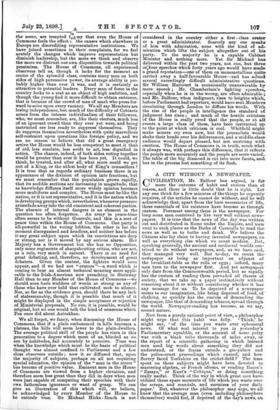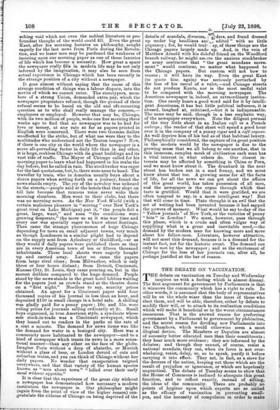A CITY WITHOUT A NEWSPAPER.
CrVILISATION, Mr. Balfour has argued, is far* more the outcome of habit and custom than of reason, and there is little doubt that he is right. Let any one think for a few minutes of the things he urgently. requires, of the articles he cannot do without, and he wilD acknowledge that, apart from the bare necessaries of life,. these essentials of his existence have become so through custom. Foremost among these is the newspaper. For long mons men contrived to live very well without news-- papers. It is true that the news of the day was written out and distributed in Rome under the Empire, and mera went to such places as the Baths of Caracalla, to read the' news as well as to bathe and drink. We believe the, Chinese also lay claim to having invented newspapers, as- well as everything else which we count modern. But,. speaking generally, the ancient and niedimval worlds con- trived to do without newspapers, and, as we have said,. they managed very well. But to-day, we count the newspaper as being as important an adjunct of the breakfast-table as the rolls or eggs ; indeed, many men turn to the newspaper first. And yet newspapers only date from the Commonwealth period, but so rapidly, has the custom of reading them pervaded all classes of society, that we take up a paper instinctively without reasoning about it or without considering whether it has any message for us. To be deprived of a newspaper seems to our imagination, like being deprived of food, of clothing, so quickly has the custom of demanding the- newspaper, like that of demanding tobacco, spread through the world. Newspaper-reading has become, as we say,, second nature.
Now from a purely rational point of view, a philosopher might urge that this habit was folly. ' he might say, of the time you waste over ephemeral news. Of what real interest to you is yesterday'a Parliamentary squabble, or the account of some petty war with a black tribe thousands of miles away, or the report of a scientific gathering in which learned men used big words about something they did not understand, or the fracas outside a gin-palace and the police-court proceedings which ensued, and how Surrey faced Yorkshire on the cricket-field ? The time spent on these subjects might have been devoted to- mastering algebra, or French idioms, or reading Bacon's "Essays," or Kant's "Critique," or doing something; really useful. Think of the way in which great men have: utilised those spare moments of life which you waste over- the scraps, and scandals, and surmises of your daily paper.' But, whatever the philosopher may urge, we all know that the average man (even including philosophera themselves) would feel, if deprived of the day's news, an aching void which not even the noblest literature or pro- foundest thought of the world could fill. Even the great Kant, after his morning lectures on philosophy, sought eagerly for the last news from Paris during the Revolu- tion, and we lesser men may be pardoned the weakness of insisting upon our morning paper as one of those luxuries of life which has become a necessity. How great a space the newspaper really fills in modern life may be not only inferred by the imagination, it may also be seen from actual experience in Chicago which has been recently in the strange position of a city without a newspaper.
It goes almost without saying that the cause of this strange condition of things was a labour dispute, into the merits of which we cannot enter. The sterotypers, mem- bers of a strong Union, demanded extra pay, which the newspaper proprietors refused, though the ground of their refusal seems to be based on the old and oft-recurring question as to who shall really manage the concern,— employers or employed. However that may be, Chicago, with its two million of people, woke one fine morning three weeks ago to find that no newspaper was to be had for love or money, at any rate so far as papers printed in English were concerned. There were two German dailies unaffected by the strike, but of what use were they to the multitudes who understood not the Teuton tongue ? Now, if there is one city in the world where the newspaper is a more all-pervading factor in daily life than in any other, it is huge, reckless Chicago with its giant buildings and its vast tide of traffic. The Mayor of Chicago called for his morning paper to learn what had happened in his realm the day before, but he called in vain. The stockbroker was eager for the last quotations, but,lo, there were none to hand. The traveller by train, who in America usually buys about a dozen papers when setting forth on a journey, found the news-stands empty. The cry of the newsboy was unheard in the streets,—people said at the hotels that they slept on till late because that raucous voice never woke their cnorning slumbers. Men went to their clubs, but there was no morning news. As the New York World (with a certain malicious pleasure in " scoring " over New York's great rival on Lake Michigan) put it, "the people felt a great, large, want," and soon "the conditions were growing desperate," the more so as it was war time and every one was specially eager to know about Santiago. Then came the strange phenomenon of huge Chicago depending for news on small adjacent towns, very much as though Londoners in a similar plight had to depend -on the supply sent from Aylesbury or Guildfcrd,—or as they would if daily papers were published there as they are in every American town of ten or fifteen thousand inhabitants. These local sheets were eagerly bought up and carried away. Later on came the papers from large rival cities ; from Milwaukee, which is only three or four hours distant ; from Detroit, Cincinnati, Kansas City, St. Louis, they came pouring on, but in the merest driblets compared to the huge demand. People stood by the news-stands in the great hotel lobbies waiting for the papers just as crowds stand at the theatre doors on a "first night." Needless to say, scarcity prices -obtained. An agent for a Cincinnati paper sold four thousand copies of his journal in less than an hour, and deposited $130 in small change in a hotel safe. A shilling was gladly paid for a penny paper ; 100. and 15c. were ruling prices for journals selling ordinarily at 2c. Small boys organised, in true American style, a syndicate whose sole stock-in-trade was a Cincinnati newspaper, which they leased out to readers in the parks at the rate of a cent a minute. The demand for news items was like the demand for water in a besieged city. Here was a community more habituated to the newspaper—and to a kind of newspaper which treats its news in a more sensa- tional manner—than any other on the face of the globe. Imagine Paris without a drop of absinthe, or Munich without a glass of beer, or London devoid of cats and suburban trains, and you can think of Chicago without her daily papers. No wonder that exasperation reigned everywhere, and that that variety of the human species known as "men about town" "lolled over their early meal without appetite."
It is clear that the experience of the great city without a. newspaper has demonstrated haw necessary a modern institution the newspaper is. Our philosopher might (again from the point of view of the higher reason) con- gratulate the citizens of Chicago on being deprived of the details of scandals, divorces, art fe•ders, and fraud dressed up under big headlines anC,, edited" with no little piquancy ; for, he would trul■ ay, of these things are the Chicago papers largely made up. And, in the vein of Matthew Arnold with his doleful friend on the Woodford branch railway, he might assure the anxious stockbroker or army contractor that "the great mundane move- ment" would continue, no matter what happened to the Chicago papers. But custom will not bow to reason ; it will have its way. Even the great Sant (to quote him again) was seriously perturbed by the loss of his rascal of a valet,—and Chicago streets do not produce Rants, nor is the most useful valet to be compared with the morning newspaper. The American newspaper is, indeed, an extraordinary institu- tion. One rarely hears a good word said for it by intelli- gent Americans' it has but little political influence, it is abused, laughed at, criticised,—but it is indispensable. The same may be said, though in a less emphatic way, of the newspaper everywhere. Note the diligent perusal of the tiny little sheet in an Italian café or a French auberge ; the reader of that sheet will spend a good hour over it in the company of a penny cigar and a café cognac. As well deprive him of his bed as of that habitual luxury. Philosophically considered, the capture of its great position in the modern world by the newspaper is due to the growing sense that we all belong to one another, that in this immense, complex mesh of civilisation each man has a vital interest in what others do. Our closest in- terests may be affected by something in China or Peru, and we must know about it. The drunkard in the next street has broken out in a mad frenzy, and we must know about that too. A growing sense for all the facts of life, for all the news we can get about the affairs of this great world, has taken possession of all men, and the newspaper is the organ through which that taste is gratified. Would that it were gratified, we are often tempted to say, in a more intelligent way ! But that will come in time. Plato thought it an evil that the art of writing had been invented because it had sapped the powers of memory. What would he say to-day of the "Yellow journals" of New York, or the varieties of penny " bits " in London ? We must, however, pass through this phase, which is a crude and often vulgar way of supplying what is a great and inevitable need,—the demand by the modern man for knowing more and more about his fellow-men. Literature, however attractive, will not meet this demand, because it is a demand for the instant fact, not for the historic event. The demand can only be met by the newspaper ; and so the excitement of Chicago for the loss of her journals can, after all, be perhaps justified at the bar of reason.



































 Previous page
Previous page